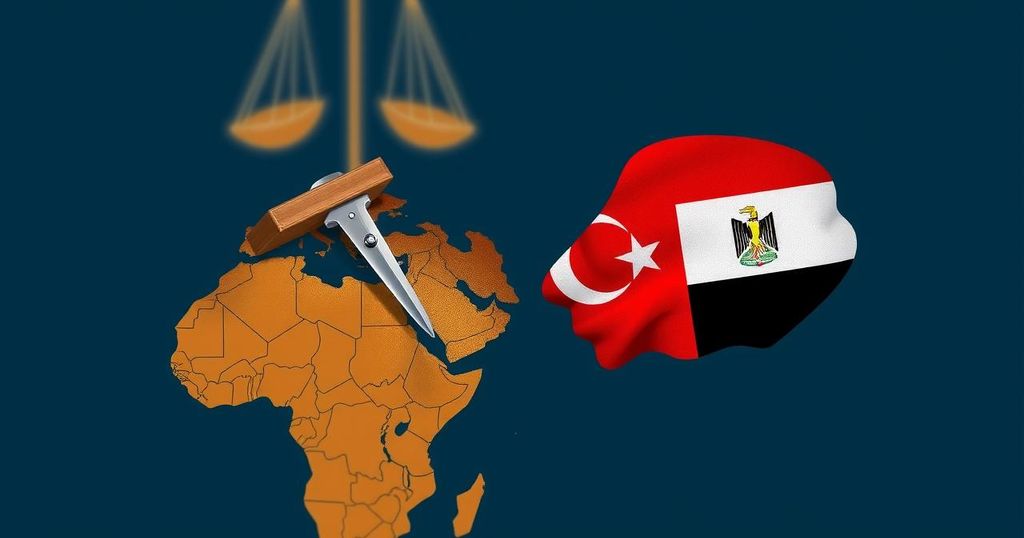Turkey and Egypt have conducted discussions to improve cooperation regarding Africa, focusing on security in the Horn of Africa amidst ongoing tensions between Somalia and Ethiopia. Both nations aim to stabilize the region through enhanced military support for Somalia and continued dialogue regarding the Libyan conflict, marking a shift from past hostilities to a more collaborative approach in foreign policy.
On Monday, Turkish and Egyptian officials engaged in two rounds of discussions focusing on the situation in Africa and Libya, a notable development reflecting the enhanced relations between the two formerly antagonistic nations. These talks addressed the ongoing tensions between Ethiopia and Somalia, particularly pertaining to the Horn of Africa and the Red Sea region, as highlighted by Egypt’s foreign ministry via Facebook. The conversations, spearheaded by Ihab Awad, Egypt’s assistant foreign minister for African affairs, and Elif Ulgen of Turkey’s Ministry of Foreign Affairs, emphasized mutual interests in ensuring security and stability within the Horn of Africa. They expressed a commitment to restoring normal shipping levels in the Red Sea and reinforcing cooperation to achieve shared objectives, particularly in supporting Somalia’s efforts to combat terrorism and enhance its national defense capabilities. In relation to Libya, the two nations pledged to maintain ongoing consultations and share insights to serve the best interests of the Libyan populace. Despite historically backing opposing factions in Libya’s conflict—Egypt supporting Khalifa Haftar and Turkey aligning with the Tripoli-based authorities—both countries have united in their support for Somalia. Notably, Turkey and Somalia recently formalized a defense agreement, allowing Turkey to patrol Somali territorial waters, while Egypt has committed troops to assist in peacekeeping efforts. Furthermore, the Egyptian moves are perceived as a countermeasure against Ethiopia, amidst accusations of Somalia meddling in Ethiopian affairs following a recent maritime agreement between Addis Ababa and Somaliland. Additionally, the Egyptian government is embroiled in a long-standing conflict with Ethiopia concerning the Great Renaissance Dam on the Nile, which raises concerns over potential water shortages for Egypt. The thawing diplomatic relations were further exemplified by Egyptian President Abdel Fattah al-Sisi’s visit to Turkey last September, marking a significant shift from over a decade of hostility stemming from the 2013 coup in Egypt that overthrew President Mohammed Morsi. There are also suggestions that Turkey may play a mediatorial role in the disputes between Egypt and Ethiopia, signaling a possible avenue for diplomatic resolution in the region.
The discussions between Turkey and Egypt arise amid a backdrop of regional tension, particularly between Ethiopia and Somalia. The Horn of Africa has been marked by disputes that impact regional stability. The longstanding issues involving the Nile River, particularly regarding the Great Renaissance Dam, have added complexity to Egypt’s relationship with Ethiopia. The evolving relationship between Turkey and Egypt also reflects broader geopolitical shifts, indicative of their mutual interests in stabilizing the Horn of Africa and improving collaborative defense strategies.
In conclusion, the recent talks between Turkey and Egypt highlight a significant development in regional diplomacy as both nations seek to address ongoing challenges in the Horn of Africa, particularly those concerning Somalia and Ethiopia. With collective efforts to stabilize the region, support Somalia’s military initiatives, and manage conflicting interests in Libya, it is apparent that enhanced cooperation could pave the way for improved security and stability in the broader region.
Original Source: www.newarab.com






